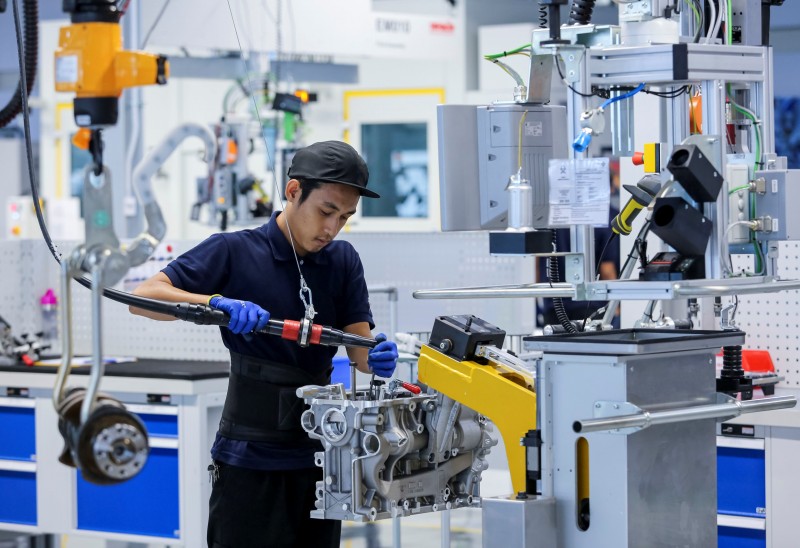
Image credit: HRM Asia
KUALA LUMPUR: Almost 50 per cent of Malaysia's labour force has been "short-changed" for more than a decade, claim experts.
They said pay disparity, especially for semi-skilled workers, remained a pressing issue, despite some reduction in the wage gap between semi-skilled and low-skilled labourers.
The Department of Statistics, in its Statistics and Wages, Malaysia, 2022 report on Wednesday, said the median monthly wage in 2022 was RM2,424, compared with RM2,250 the previous year.
It said the average pay of semi-skilled workers was RM2,241 last year, compared with RM2,064 in 2021. Low-skilled workers, meanwhile, saw their average pay increase by RM66, raising their earnings to RM1,815 from RM1,749 in the previous year.
However, Dr Mohd Yusof Saari, an associate professor at the School of Business and Economics at Universiti Putra Malaysia, said from 2011 to 2021, semi-skilled workers had the lowest wage growth, at four per cent, behind low-skilled (6.9 per cent) and skilled workers (4.9 per cent).
Yusof, a labour market economist, said a growing gross domestic product (GDP) should have seen a corresponding increase in wages across all levels, but that was not the case for Malaysia.
"The increase of total wage index in the country is predominantly driven by high-income earners (who primarily hold corporate jobs). So there is indeed a huge wage disparity."
This, he noted, was significant given that semi-skilled and low-skilled workers make up 46 per cent of employment.
Inflation, he said, also played a role in wage disparity.
He said that in 2022, inflation stood at 3.3 per cent, while in 2019, it was at 0.6 per cent.
He said when factoring in inflation, the overall condition of workers in 2022 deteriorated.
"It's important to note that (data on) the average wage growth in 2022 does not provide insights into changes in working hours or the prevalence of multiple jobs.
"However, if we analyse and compare the working hours of workers in 2022 with those before the Covid-19 pandemic, the situation is likely to appear even bleaker.
"Linking salaries and wages with inflation clearly shows the decline in purchasing power for skilled and low-skilled workers (with the purchasing power of the latter affected seriously).
"These two groups make up about 46 per cent of employment in the economy," he said.
Yusof said the outlook for 2023 suggests a potential worsening of the situation, particularly with price increases in essentials like rice, cooking oil and flour.
He said the generation of new jobs was expected to be restricted by inflation.
He said there was a growing need for government intervention to stimulate consumer demand, which, could lead to the creation of additional income through job opportunities.
"In 2023, we are witnessing a distinct narrative of living conditions of workers deteriorating.
"There are instances of individuals buying rice only on a per-kilo basis instead of buying it in larger quantities, like 5kg or 10kg, reminiscent of the economic conditions of the 1980s," he said.
Yusof said one way the government could improve the lot of workers was by reducing corporate taxes in order to boost employee compensation.
He cited Germany's adoption of tax burden policy interventions as an example.
The implementation of this business tax from 2000 to 2001 saw the share of labour compensation relative to GDP increase from 55.6 per cent in 2005 to 59.2 per cent in 2019.
This, he said, occurred concurrently with a gradual reduction in the corporate tax rate from 38.3 per cent to 30 per cent, exemplifying the substantial influence of tax reduction on labour compensation.
He said within the Malaysian context, studies have found that a one per cent increase in tax incentives correlates with a substantial 2.87 per cent rise in employee compensation.
"The solution is there, all it takes is just the political will," said Yusof.
Economist Dr Elya Nabila Abdul Bahri of Universiti Malaya agreed that there was a need for wages to correspond with the increase in productivity.
"Look at countries such as Australia and South Korea. Although salaries are higher than workers' productivity, their productivity is higher than Malaysia."
She also agreed with the call for the government to help businesses adopt advanced technology and automation to boost economic productivity.
"Businesses must see it (wage increments) as a return on investment since wage is a monetary factor of motivation to perform better."
Source: https://www.nst.com.my/news/nation/2023/09/960842/wage-disparity-workers-are-being-short-changed-nsttv

